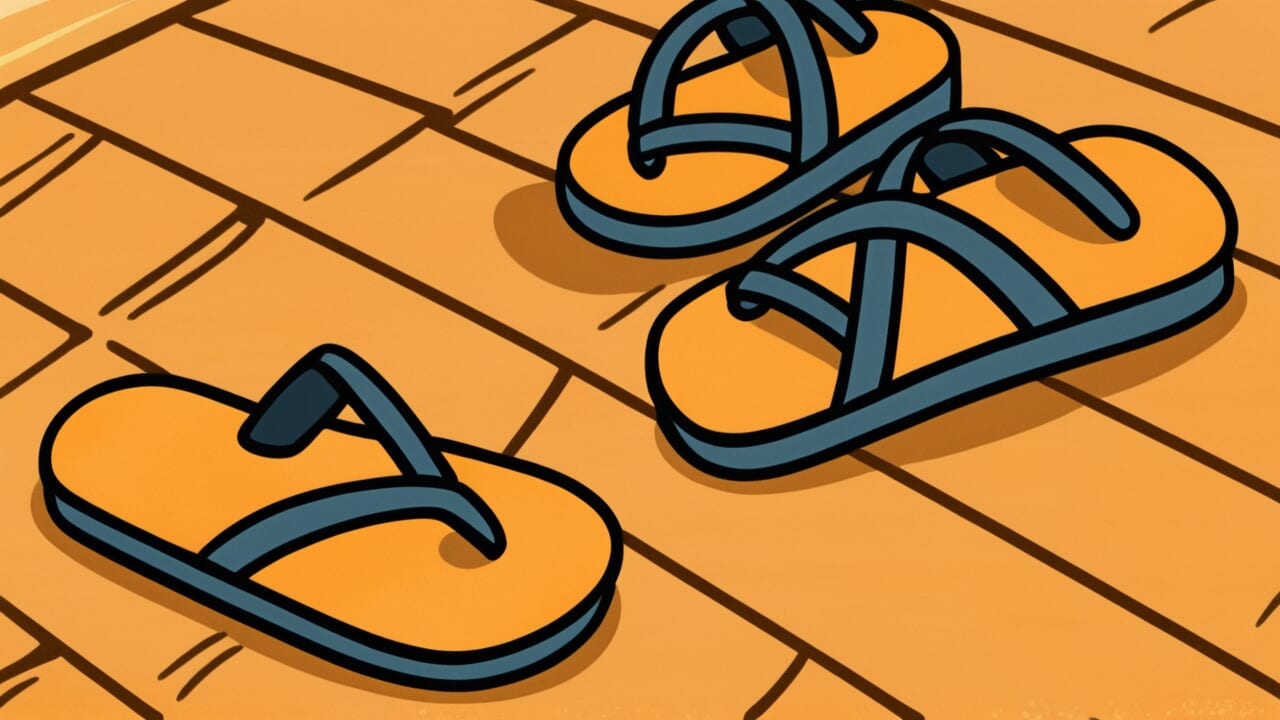How to Read “Airing sandals during the dog days of summer”
Setta no doyōboshi
Meaning of “Airing sandals during the dog days of summer”
“Airing sandals during the dog days of summer” is a sarcastic way to mock someone who acts arrogant and puffed up. The expression comes from how dried-out sandals curl backward during summer airing, resembling a person sticking out their chest in a pompous manner.
This proverb is used when you see someone acting superior without real ability. It also applies to people who suddenly become arrogant after a small promotion.
Rather than directly criticizing someone by saying “Stop being arrogant,” this saying uses the comical image of curled-up footwear. It laughs off their pompousness with humor.
Even today, you might see bosses who become overbearing right after a promotion. You might notice people who get conceited after a small success.
In these situations, this expression works as a sharp yet humorous criticism. The concrete image of curled sandals perfectly captures how ridiculous arrogant people look.
Origin and Etymology
The origin section could not be generated.
Interesting Facts
The metal studs hammered into the bottom of setta are called “settaびょう.” They make a distinctive clinking sound when you walk. Stylish men in the Edo period loved walking around making this sound echo.
However, walking too loudly was seen as “making noise to show off.” This also became a target of mockery. Setta weren’t just functional footwear—they reflected the wearer’s character.
Doyō-boshi actually happened during all four seasons, not just summer. The summer airing after the rainy season was most important, though.
This was practical wisdom for protecting precious items from mold and insects in Japan’s hot, humid climate. During this period, the leather would shrink and curl backward—a real practical problem.
Usage Examples
- He suddenly became arrogant as soon as he made section chief—just like airing sandals during the dog days of summer.
- She got a little praise and now she’s puffed up, curled backward like airing sandals during the dog days of summer.
Universal Wisdom
The proverb “Airing sandals during the dog days of summer” contains deep insight into human arrogance. Why do people become pompous after small successes or slight rises in status?
It’s because humans fundamentally need recognition. People who haven’t been acknowledged for a long time often don’t know how to express their joy when finally recognized. So they express it through arrogance.
Like curled sandals, they can’t resist the force pushing them up from inside.
But this proverb has been passed down through generations not just to criticize human weakness. Rather, it warns us that we ourselves could become “curled sandals” at any time.
Everyone has a desire to be recognized and respected. How we behave when that desire is satisfied reveals our true character.
Our ancestors used the comical image of curled sandals to laugh at arrogant people. But they also used it to discipline themselves.
The spirit of self-discipline wrapped in humor—that’s the universal wisdom this proverb holds.
Power and success change people. But this proverb quietly yet firmly teaches the importance of staying humble. It reminds us not to be swallowed up by success.
When AI Hears This
Doyō-boshi, which protects setta from moisture, actually touches on the essence of material “degradation.” According to the second law of thermodynamics, all systems naturally move toward disorder—entropy increases.
Moisture invading setta is a perfect example of this law. Water molecules randomly enter gaps in leather and bamboo fibers, disrupting molecular structure. This is the true nature of “degradation.”
What’s interesting is that doyō-boshi isn’t just drying—it’s system reconstruction through energy input. Sunlight provides thermal energy to water molecules, giving them kinetic energy to escape the material.
At the same time, ultraviolet rays destroy microbial DNA, eliminating mold as another disorder factor. In other words, entropy accumulated over a year is intensively expelled from the system.
Just as living things use energy from food for metabolism and discard disorder as waste, setta also restore order through periodic energy input.
Physicist Schrödinger described life as “an entity that feeds on negative entropy.” Tool longevity actually follows the same principle.
Our ancestors didn’t know thermodynamics, but they understood through experience how to fight entropy.
Lessons for Today
This proverb teaches modern people that success is exactly when we must remember humility. When you get lots of likes on social media, when your work is recognized, when you pass an exam—reflect on your attitude in those moments.
What’s important is that celebrating success and acting arrogant are completely different. Joy can be shared with others, but arrogance pushes people away.
Curled sandals are hard to wear and lose their practicality. Similarly, arrogant people lose trust from others and can’t demonstrate their true abilities.
If you notice someone “curling backward,” remember this proverb. You can approach them with humor rather than direct criticism.
More importantly, develop a habit of checking whether you yourself are curling backward.
Success is an opportunity for growth, not a reason to be arrogant. By maintaining humility, you can achieve even greater success.



Comments